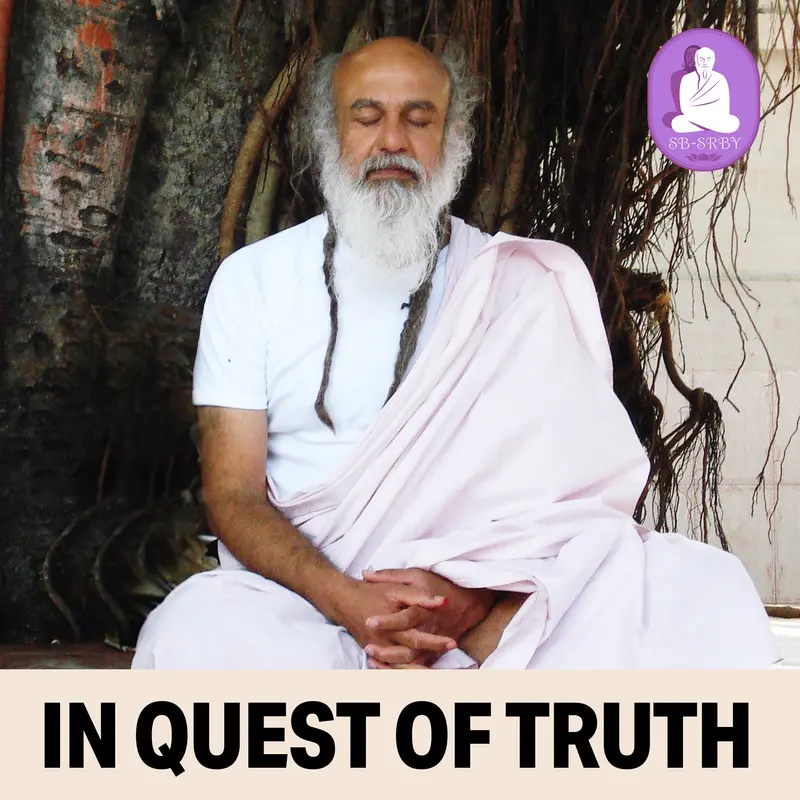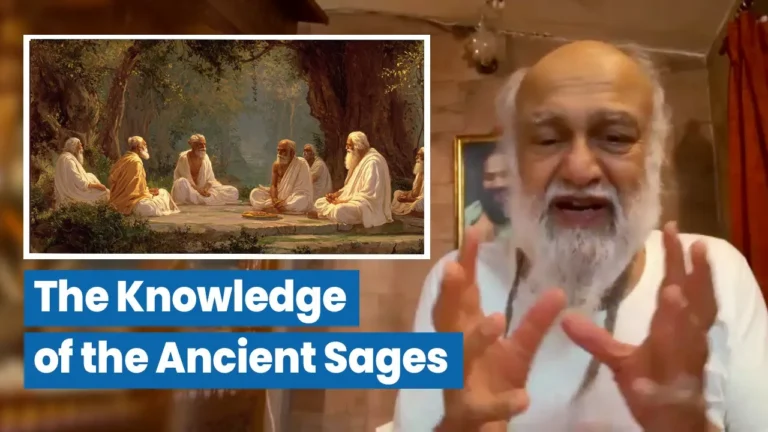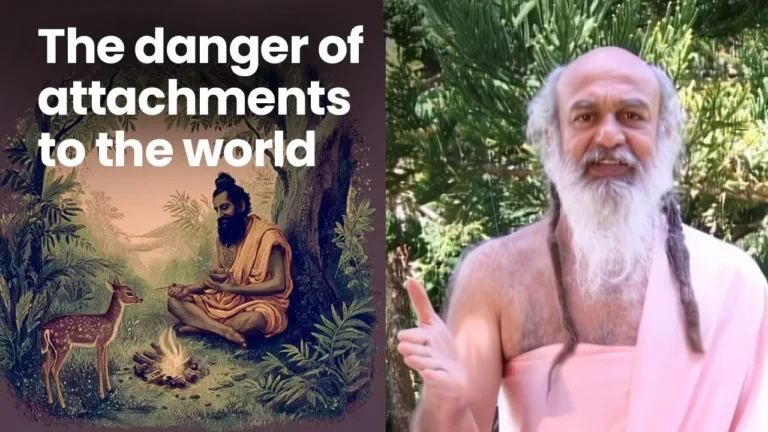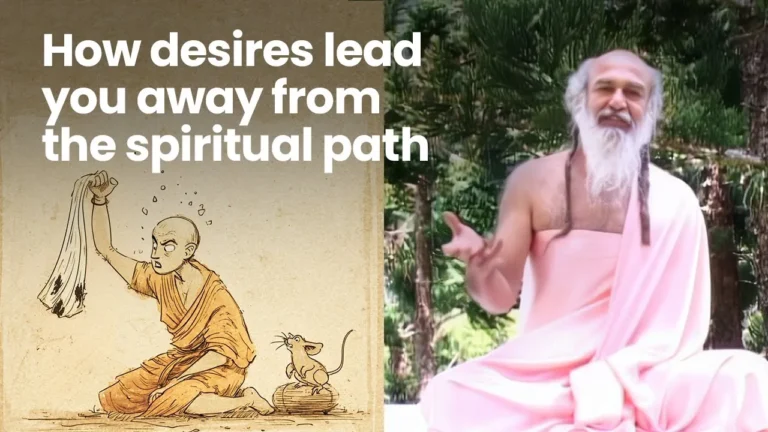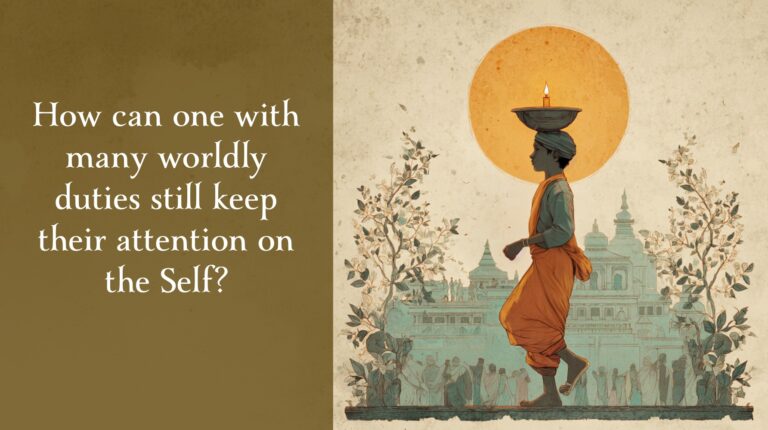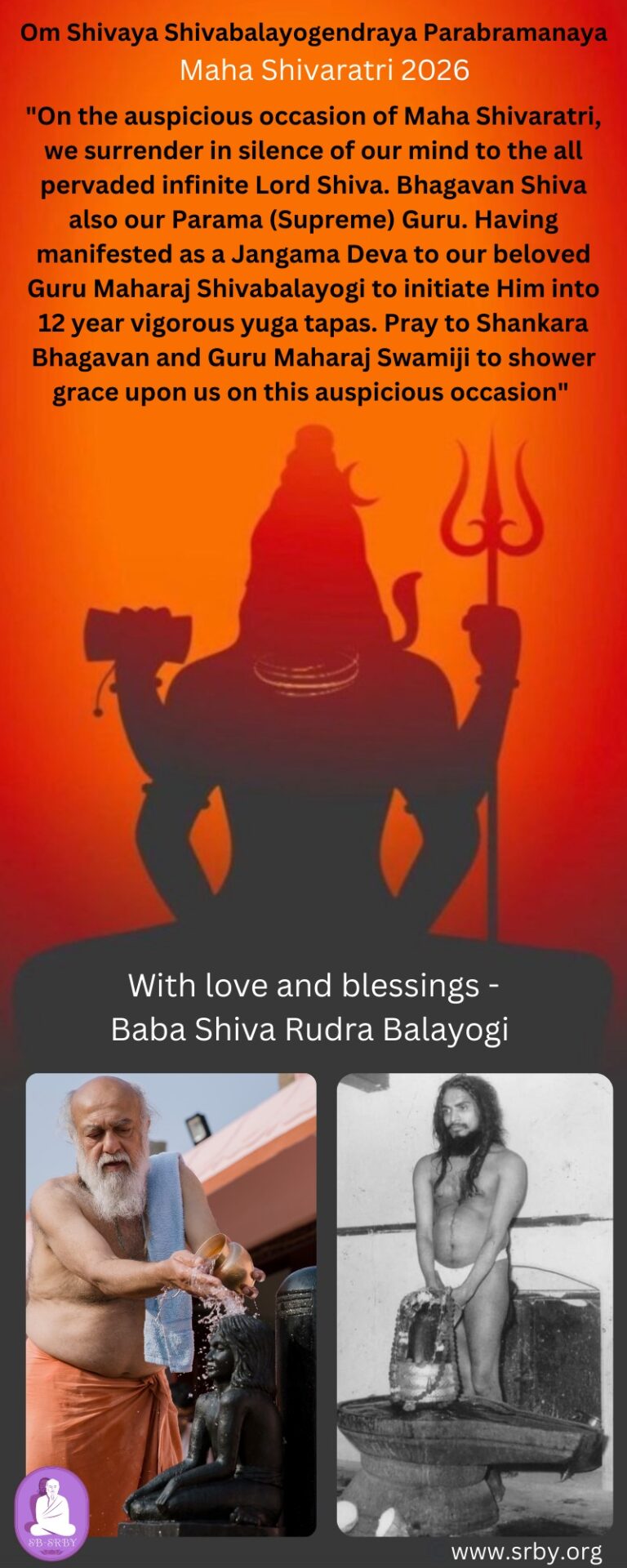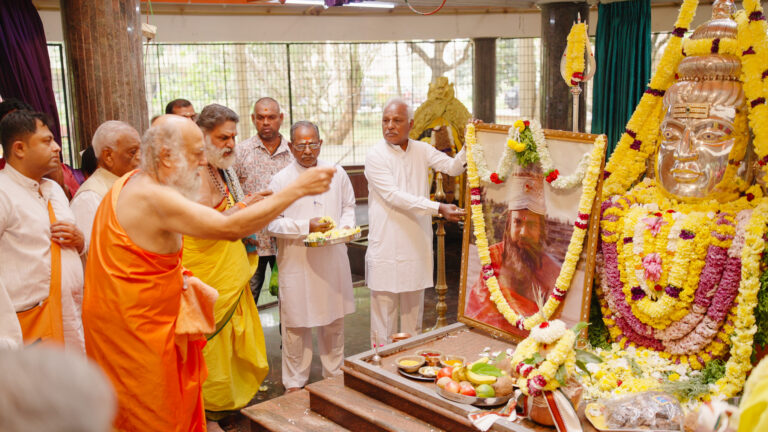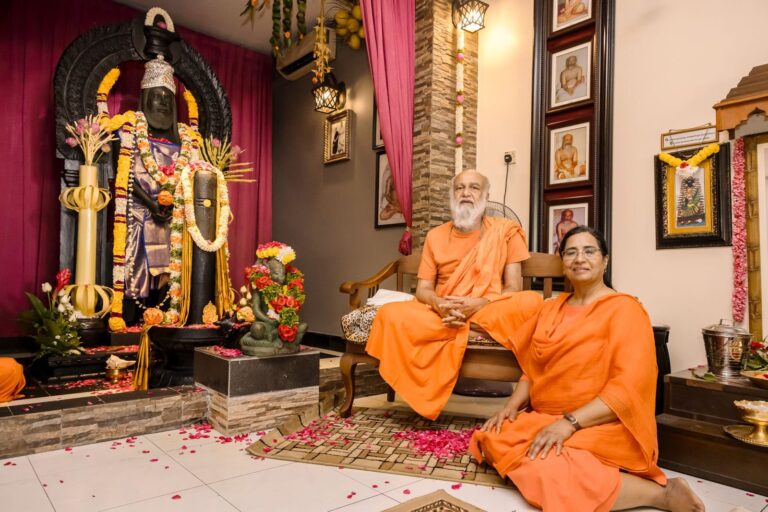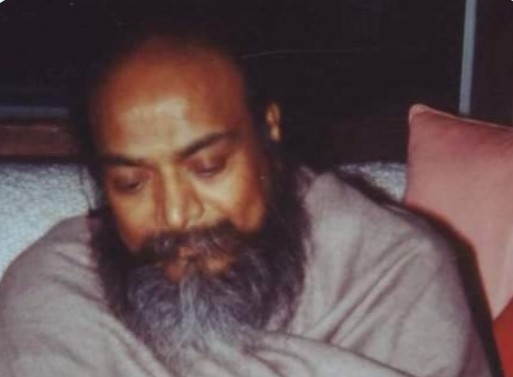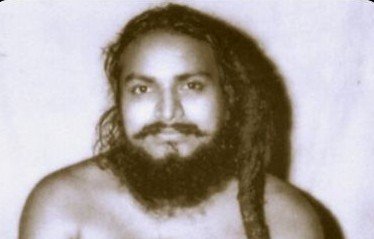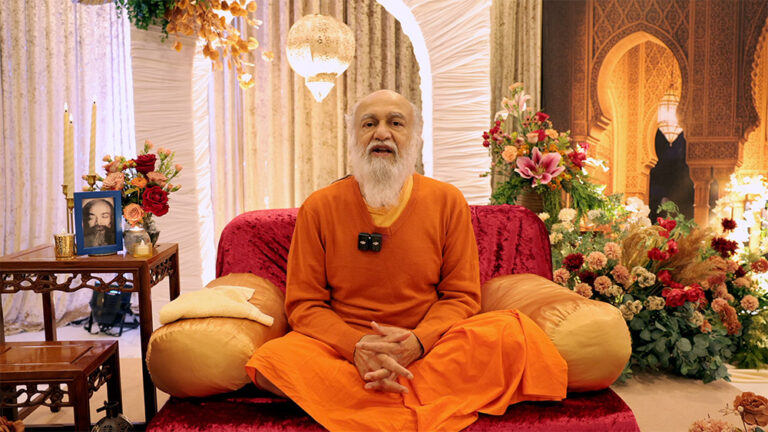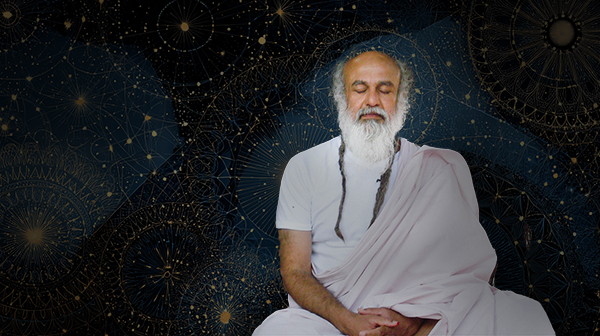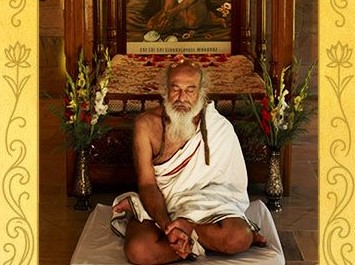October 2005 Tour -Sunshine Coast – Day 5
Brahmanandam Paramasukadam
Kevalam Jnanamurtim
Dvandvaateetam Gaganasadrisham
Tattvamasyadi Lakshiyam
Ekam Nityam Vimalam Achalam
Sarvadhi Sakshi Bhutam
Bhava Teetam Triguna Rahitam
Sadgurum Tvam Namami
Once again taking the opportunity to offer my unconditional surrender at the Lotus Feet of my beloved Guru Shivabalayogi, I greet you all with my love and blessings. I pray that you may all be showered with the Divine Luck to attain the Supreme Peace.
Over the last few days we’ve talked about meditation and the need for meditation. Today I shall tell some stories from Yoga Vasishta. Yoga Vasishta is a discourse given by sage Vasistha to Shri Rama for seven days, and at the end of these seven days Shri Rama went into deep Nirvikalpa Samadhi. Shri Rama had gone into a deep depression and became concerned about the questions of life and death. “Why are we born to then only die? Die only to be born again?” Life is full of dualities – good, bad, happiness becomes unhappiness and then returns to happiness again.
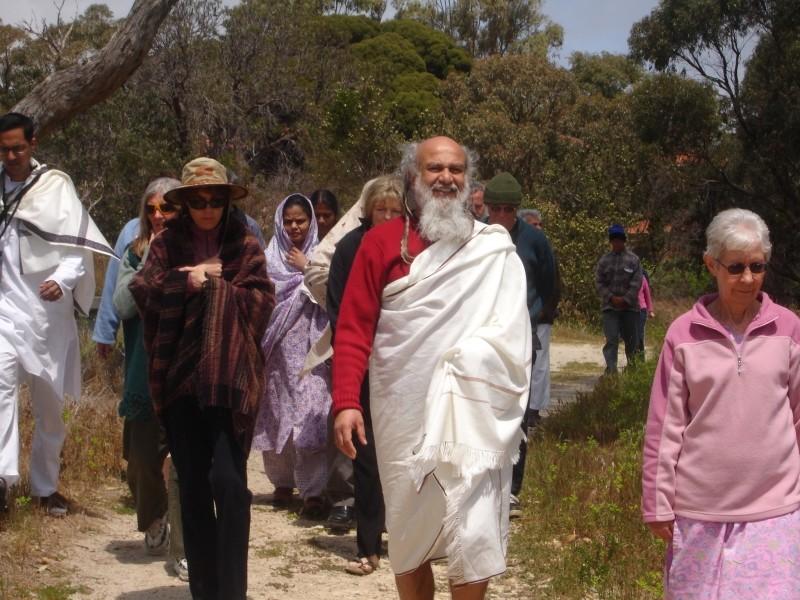
There is suffering in this world, there is physical suffering. But it is ultimately the mental suffering which is more painful. Even physical pain – pain in the physical body – is actually experienced through the brain, in the mind. Vasistha explains the mind is too involved in the world, and there is no peace there. Just like if you can’t sleep then those 8 hours seems like 8 years, 8 ages. Or when you start off the 45 minutes of meditation it seems too long. But if one sleeps well, time passes so quickly. Thus as you get more practiced into the meditation, then this 45 minutes of meditation will pass like 2 minutes. This is the effect of the imagination of time. The space imagination is also active. The clue to this can be seen in dreams. In a dream – it can be sensible or it can be nonsense – you will find with time that the time you sleep may be one or two hours, but it may seem to be years in the dream itself. Likewise with space you may seem to travel widely.
Then who is it that is watching the dream? Even if you’re playing a role in this film-dream, still you are also watching. Who is this that watches? This is an important clue.
A dream may occur in varying potencies – it may be vivid and clear and thus easy to remember, or vague and weak and therefore difficult to recall. My Guru recommended this book Yoga Vasishta to me and told me, “If you read and understand it properly it will help you.” In the text itself the sage narrates, “There is no problem anywhere. Simply the problem is in your own mind and its imaginations.”
One story from the Yoga Vasishta tells the story of King Padma and his Queen Lilavati who was a devotee of Goddess Saraswati, the goddess of knowledge. She had a particular siddhi (power) in that whenever she prayed to Saraswati, then the Goddess would manifest in front of her. Now once there was a war and the king was killed on the battleground. Hearing her beloved husband has died, Queen Lilavati weeps for eight days continually, and is distraught. After these eight days, finally her mind becomes a little calm. (Here I am reminded of the song by Saint Kabir – “How long do you think your loved ones will cry for you and remember you when you are gone? So you yourself, you alone, have to find your real Self.”)
In the story, Queen Lilavita prays to Saraswati. In her prayer she fights with Saraswati and demands, “I am your devotee. How could you let this happen?” This is what we tend to demand of God – we have unrealistic expectations; we want money in abundance, no illness and no death. So Lila prays to Saraswati and Saraswati appears in front of her and says, “If you think this physical body is your husband, he is in front of you, then there is no point in you crying for that physical body. But if you think he is soul, then I will show that to you. The queen asks to see her husband’s soul, so she and goddess Saraswati travel off in their subtle bodies together on a long, long journey, They travel for a long time and eventually come to a far away loka (distant planet) and the goddess shows her, “Here, this is your husband.” Saraswati shows her a man of 40 years of age with several wives, children and a whole family. Queen Lilavati asks, “How is this possible when he only died 8 days ago?” Saraswati then shows that this is all based in the mind’s imaginations of time and space – that it is an illusion. As long as the physical body exists, there is a relationship. When the body goes, the relationship does not go on.
In another story from Yoga Vasishta, a magician visits a king’s court. He brings with him a big wheel. He tells all those present that for this trick, they should simply pay attention to this wheel. He sets the wheel spinning and as they watch with their attention on the wheel, suddenly a beautiful horse appears from the wheel and comes and stands in front of the king. The king mounts the horse and the horse runs off. The king’s army follows, but cannot keep up with the horse and he is carried off. He travels for many days and then eventually the horse stops. He is thirsty and hungry and so goes to a well to get some water. Just then an untouchable girl comes and brings out the water and gives it to him to drink. She is very beautiful and the king wants to marry her, so he goes to the girl’s father to ask for her hand in marriage. The father says, “If you want to marry my daughter then you must live here.” So the king marries her and settles there, lives and they have children. Eventually after several years a calamity occurs and the whole village is destroyed. His wife dies and everybody is suffering. Then suddenly he finds he has woken up and is surrounded by his courtiers. So Vasishta is trying to show here how illusion –maya – can occur through your own mind.
In creation the legend says that as creation occurred, Maharudra suddenly appeared. He shouted, “Who am I?” A Divine voice told him to sit and concentrate between the eyes, and then he would know who he is. God created illusion so that the creation would continue. So there is duality to keep this going. We are happy, then unhappy and then happy again. This is why meditation is taught – to overcome the mind’s illusions. A separate mind is creating separate worlds for everyone. The mind tricks you.
You learn all this through meditation and Tapas. Everything is only happening in the mind. Everything actually is OK. Like when you’re watching a movie, your mind gets so sucked into the movie. Someone might come and try to wake you up, “This is all just a dream.” Yogis do this. So I try to teach, “Meditate and then the dream will end.” The world is just one long dream. The dreams you have at night are simply shorter ones.
My Guru used to tell a funny story about how a disciple should not try to overtake the Guru. Swamiji would tell like this – would suddenly tell me these stories without me asking anything; suddenly He would tell.
There was a great Master of wrestling who was now 80 years old. A young man came and asked to become his student, so the Master said, “OK.” The student learnt well and eventually the Guru said to him, “You have learnt everything now.”
So then the student goes to the king and boasts, “I can beat the wrestling master.”
The king asks him, “Are you sure you can beat him?”
“Yes. I have learnt all the tricks of wrestling.”
So a championship match is declared. It is very exciting for everyone, as the Master has not been beaten in wrestling in decades. On the day of the match, when the two start wrestling, very quickly the Master defeats the student.
Suffering defeat, the student declares, “You tricked me!”
To which the Master replies, ” You scoundrel. I knew you were tricky and so I kept this last trick to myself.”
So the disciple should always know his place with his Guru. He should show proper manners. Swamiji used to say that just like a father will have a son, then when the son grows up and he has sons, he still remains a son to his father. Although he himself is a father to his own sons, to his father, he is still a son. So in the same way, when learning philosophy and spiritual things, the reverence is so important so that ego doesn’t go out of control.
For the new people here this evening, I will explain again – the mind has gone out of control into this world and you have forgotten whom you really are. You need to regain this knowledge of who you are really. My Guru used to say if you practice this meditation for one hour daily, you will achieve the goal if it is done sincerely. You are your own examiner in this; watch yourself.
If you remember back to the first day you tried to learn how to drive a car – it would have been awful. There are so many things to do at the same time. It is the same with this meditation. You will get more skill over time. Eventually you will reach that goal – the Supreme Peace.
This Supreme Peace is much beyond the bliss. Not that there is no bliss in It or there is bliss in It – It is beyond bliss. So Vasishta says, “It is neither something nor nothing.” Just like in this room you could say it is devoid of space or full of space – depending on your view. There is nowhere where space is not.
We need to live in harmony together. To do this we have two mantras to follow, “Adjust” and “Accommodate”. Then we will adjust to whatever happens in the world around us.
This is what Prahlada finds when he asks, “What is a Jivanmukta – a Self Realized soul?”
The Lord takes him and shows him a man lying on a rock.
He asks the man, “How are you here?”
“I’m simply here.”
So again he asks, “What happens to you?”
“I am always happy. Sometimes I am in luxury; sometimes I am eating only scraps. Sometimes I am applauded; sometimes abused. But my mind is always on God so I am always happy.”
I mentioned that Peacefulness is higher than bliss. In bliss there is still some excitement of the imaginations. When you meditate and the mind is going towards God, in the final stages there is an overwhelming blissfulness. But the Gurus taught us that detachment is important here. This is what the Gurus taught us. In the same way Swamiji told, “I only scold you for your faults so you will be perfect.”
So we offer this technique of meditation to you to give you this Peace.
Questions and Answers
Question:
About two-thirds of the way into the meditation my eyes started waving, I started yawning a lot and felt a little nauseous.
Babaji:
Yawning needs to be controlled so one does not go to sleep. If the eyes start wavering, if one is feeling giddy or nauseous it may be from gas or acidity in the stomach. So delay the time for meditation to one or two hours after the meals. Too much fasting can also cause this. If it persists, then one should see a doctor.
Question:
What is the use of the bliss on the path?
Babaji:
It is a higher quality of imagination, but one still needs also to go beyond this. One needs to be detached during this; one needs simply to wait and it will recede until Peace comes.
The mind has to settle naturally and effortlessly into the Self and stay there. Bliss is a higher form of imagination, close to God. But one needs to go on and not just stay there. Guru and God will lead you on to the Peace.
Question:
Reverence for the Guru – how do we cultivate it?
Babaji:
Cultivate it by thinking; as everything happens by thinking only. One should think, “This is the Guru. I have accepted Him; so let me follow the path to the Truth. This is for my own benefit.” This way of thinking will cultivate it.
Bhakti marga, the path of devotion, is based on this. The mind and its imaginations have gone out of control. So in this path of devotion, using the same thing one brings it back under control. So if the mind is trying to trick you, “Do not have reverence to him” then one should follow the thought, “No. I am going to have reverence to Him.” With Swamiji I used to think, “If He cuts off my head, still I will follow Him.” Anything, any obstacle is a test from God only.
Question:
Can you touch on Grace and how it works?
Babaji:
The Divine’s Grace is always flowing. Shri Ramakrishna used to say, “The Guru’s Grace is always flowing; you have to build a dam called ‘Faith’ to catch it.” So be sincere and have faith and ultimately this Grace will descend. So thus prayers are taught – they help to concentrate the mind. When one practices sadhana then the mind becomes concentrated, it touches the Divine and then Grace automatically has to flow.
Ramakrishna told a story – Once there lived a pundit who lectured the people on philosophy and he had a servant lady from a nearby village. At one time there were heavy rains and a flood occurred. When the flood passed the pundit thought he could get the lady to come when the next flood occurred and explained to her she would still be able to cross the river if she recited the Guru’s name. “If you remember the Guru’s name you can come safely.” Because he spoke so well when lecturing, the lady had great faith in the pundit as Guru. When the next flood occurred, he was surprised to see her arrive to serve him despite the river being flooded. So he enquired how she had been able to do that.
“You told me that I should recite the name of Guru and then I would be safe. Thus reciting your name I was able to cross the river safely and come here.”
The pundit was surprised, and felt, “If she can do it, then so can I.” But when he tried to recite the name and cross, because he had no faith, he failed and nearly drowned.
Question:
Can You please explain about the vibhuti?
Babaji:
Vibhuti is a form of the Divine and the Divine Grace. It is an ancient thing and is common in India. It helps you receive the Divine’s Grace.
Question:
Can You please tell us your experience when you became Realized?
Babaji:
It is difficult to explain, as it has no relative qualities. The mind loses all imaginations and ego and remains settled in the Self effortlessly without imaginations of ‘I’, and in Supreme Peace. There is Awareness of Existence, but no imaginations of who you are. All imaginations are gone.
If you are living here and someone asks you to explain where you live, you will say “Number 6 Such-and-such Street”. Now if you travel further away, if someone else asks you where you live, you will just say, “Buderim.” If you travel still further away you will reply, “Sunshine Coast.” If you travel still further, say overseas, then if someone asks that question you will say, “Australia.” So in this way you are beginning to expand your identification. If you were to leave the Earth and were then asked where you came from, you would just say, “Earth.” So in this way the consciousness expands from a small place to a bigger place.
There is a story that once Adi Shankaracharya got a small ego. As he was walking, Lord Shiva came in front of him in the form of an untouchable carrying alcohol in a jug on his head. Seeing this, because of the small ego he had developed, Shankaracharya told him, “Go away.” The untouchable replied, “I will go away gladly if you can show me a place which is beyond this space which we live in.” Hearing this Shankaracharya realized this was no ordinary person in front of him, and prostrated.
This is why a Yogi loves everyone; because He sees God. He sees the Self everywhere.
Question:
From that stage of Realization, does it require will to stay in touch with the body?
Babaji:
Yes, it requires a small sattvic ego to keep in contact with the brain, so that the mind will operate in this world. The mind needs to be in contact with the brain or the brain will die. A Yogi keeps only the minimum amount of attention required to keep this occurring.
Still a Yogi will be able to come back only if the Divine ordains it, otherwise He may not be able to come back.
So my ego is my dear Guru’s name and His mission. I simply love Him and can’t possibly go against Him in any way. So following His directions we hold programs in which we teach meditation, sing some bhajans, offer Prasad and answer your questions. These were dearer to Him. This is the ego that I have by my Guru’s Grace and it is used to do His work. As long as that is there you will see Baba in this physical body. Once that is gone, (Baba clicks His fingers) it’s over!
Copyright © 2005 SRBY, All rights reserved.

